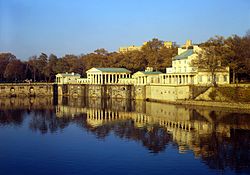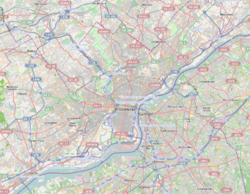Fairmount Waterworks
|
Fairmount Water Works
|
|

Fairmount Water Works – view from 1984
|
|
| Location | Philadelphia, Pennsylvania |
|---|---|
| Coordinates | 39°57′56″N 75°10′51″W / 39.96556°N 75.18083°WCoordinates: 39°57′56″N 75°10′51″W / 39.96556°N 75.18083°W |
| Built | 1812–1815 |
| Architect | Freaderick Graff et al. |
| Architectural style | Mid 19th Century Revival, Palladian |
| NRHP Reference # | 76001662 |
| Significant dates | |
| Added to NRHP | May 11, 1976 |
| Designated NHL | May 11, 1976 |
The Fairmount Water Works in Philadelphia, Pennsylvania was Philadelphia's second municipal waterworks. Designed in 1812 by Frederick Graff and built between 1812 and 1872, it operated until 1909, winning praise for its design and becoming a popular tourist attraction. It now houses a restaurant and an interpretive center that explains the waterworks' purpose and local watershed history. It was designated a National Historic Landmark in 1976 for its architecture and its engineering innovations. It was the nation's first water supply to use paddle wheels to move water.
Following a series of yellow fever epidemics in the late 18th century (which was at the time thought to be caused by unclean water or by rotting matter in the streets) city leaders appointed a "Watering Committee". The initial water system was designed by Benjamin Latrobe and accepted by the committee in 1799. His system utilized two steam engines (in series) to pump water from the Schuylkill River, into the city, then into two wooden tanks that held a total of just 57,000 US gallons (220,000 l). From the wooden tanks, the water was gravity fed into a series of wooden water mains. The system was plagued with problems. If either of the steam engines failed, the water supply to the city was cut off.
The committee began searching for another solution and eventually picked John Davis and Frederick Graff (Latrobe's apprentice and successor as chief engineer) to design a new waterworks, in order to meet the demand of the increasing numbers of city residents and to solve the problem of inadequate storage capacity.
The Fairmount Water Works was initially constructed between 1812 and 1815 on the east bank of the Schuylkill River. The Water Works initially consisted of a 3 million US gallons (11,000,000 l) earthen reservoir atop Faire Mount (now site of the Philadelphia Museum of Art), and a pump house with two steam engines to pump water. Between 1819 and 1821, a 1,600-foot-long (490 m) dam was built across the Schuylkill to direct water to a Mill House with three water wheels that replaced the steam engines in 1822. Later, Jonval turbines were used to lift the water in a New Mill House and in the renovated Old Mill House.
...
Wikipedia



